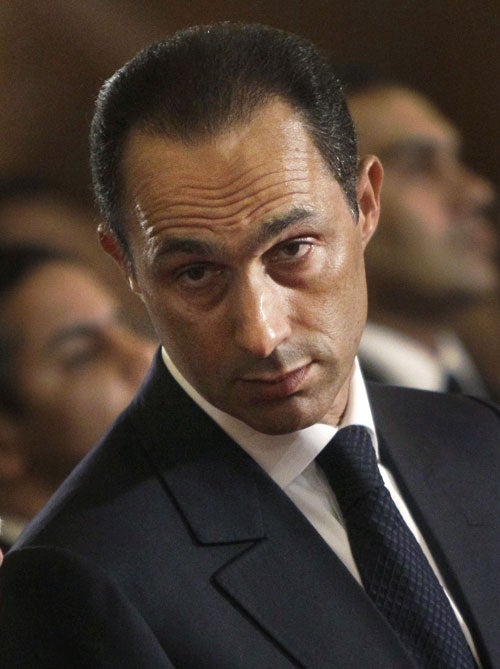Behind closed doors, the 'wise men' take on the politicians

The movement for change in Egypt got a resignation yesterday, but not the one they wanted. Late in the day in Cairo, it was announced that Mubarak had quit – Gamal Mubarak, that is, the President's son – from the leadership of the ruling National Democratic Party, along with the rest of the six-man top echelon. A welter of confusing reports that Hosni Mubarak had resigned, too, were denied and counter-denied, but, either way, Mr Mubarak would remain President, an official said, omitting to add "for now".
The resignations were the climactic moment on a day when the struggle over the future of Egypt moved from the rock-strewn streets of Cairo to behind some of its most ornate, and hitherto closed, doors. Leaders of Egypt's unprecedented wave of anti-government protests had held talks earlier with the Prime Minister over ways to ease President Mubarak out of office. But the government also appeared yesterday to be calculating that, with concessions such as the party resignations, it could ride out street demonstrations for a while longer. The suspicion is that we are now in the period that, while the redundancy terms of a former mover and shaker are sorted out, he is allowed to keep his former grand-sounding nameplate on the desk.
The black-sack moment may not be far off, and transitional sorts of noises were being made in Cairo yesterday. Prime Minister Ahmed Shafiq said that stability was returning, appearing confident that a deal on reforms can be reached with the multiple opposition movements to defuse protests without the 82-year-old Mr Mubarak necessarily leaving power immediately. Opposition groups have reportedly not yet agreed on a common position ahead of negotiations with Vice-President Omar Suleiman.
In the capital, it was the quietest day yet since the unrest began. Tens of thousands of protesters, who have to vowed not end their mass rallies in Tahrir Square until Mr Mubarak quits, were waving flags and chanting there a day after some 100,000 gathered for what they had optimistically called "the day of departure". It was not, and his leaving of office may yet take some more negotiation.
The 12-day uprising has entered a delicate new phase. Organisers fear that without the pressure of protesters on the street, Mr Mubarak's regime will enact only cosmetic reforms. They are reluctant to lift their demonstrations without Mr Mubarak's removal and a transition mechanism that guarantees a real move to democracy. From its side, the government has sought to draw opposition parties and the youth groups involved in the protests into negotiations on constitutional reforms so presidential elections can be held in September to elect a new president. Protest organisers, wary of a trap, have refused until Mr Mubarak goes.
At a televised press conference, Mr Shafiq suggested the government hopes to convince enough factions to enter talks that the others, such as the Muslim Brotherhood, will be forced to join in. He noted that the protesters had changed their slogan from "day of departure" to a "week of steadfastness". "All this leads to stability," he said.
Mr Shafiq and Mr Suleiman have taken the lead in trying to arrange reform negotiations. The United States, Egypt's top ally, has pressed Mr Mubarak to launch a democratic transition immediately and step aside quickly. The administration has held behind-the-scenes talks with Egyptian officials on a variety of ways to do that.
Friday saw the tentative contacts between the government, protest organisers and independent actors trying to convince the leadership on a graceful way out for Mr Mubarak. A self-declared group of Egypt's elite – called the "group of wise men" – has circulated ideas to try to break the deadlock, among them a proposal that Mr Mubarak delegate his powers to Vice-President Suleiman and step down in everything but name, perhaps keeping the presidency title for the time being at least.
The "wise men" have met Mr Suleiman and Mr Shafiq twice in recent days, said Amr el-Shobaki, a member of the group. Their proposals also call for the dissolving of the parliament and the end of emergency laws that give security forces near-unlimited powers.
"The stumbling point remains that of the president stepping down," Mr el-Shobaki said.
Join our commenting forum
Join thought-provoking conversations, follow other Independent readers and see their replies
Comments
Bookmark popover
Removed from bookmarks